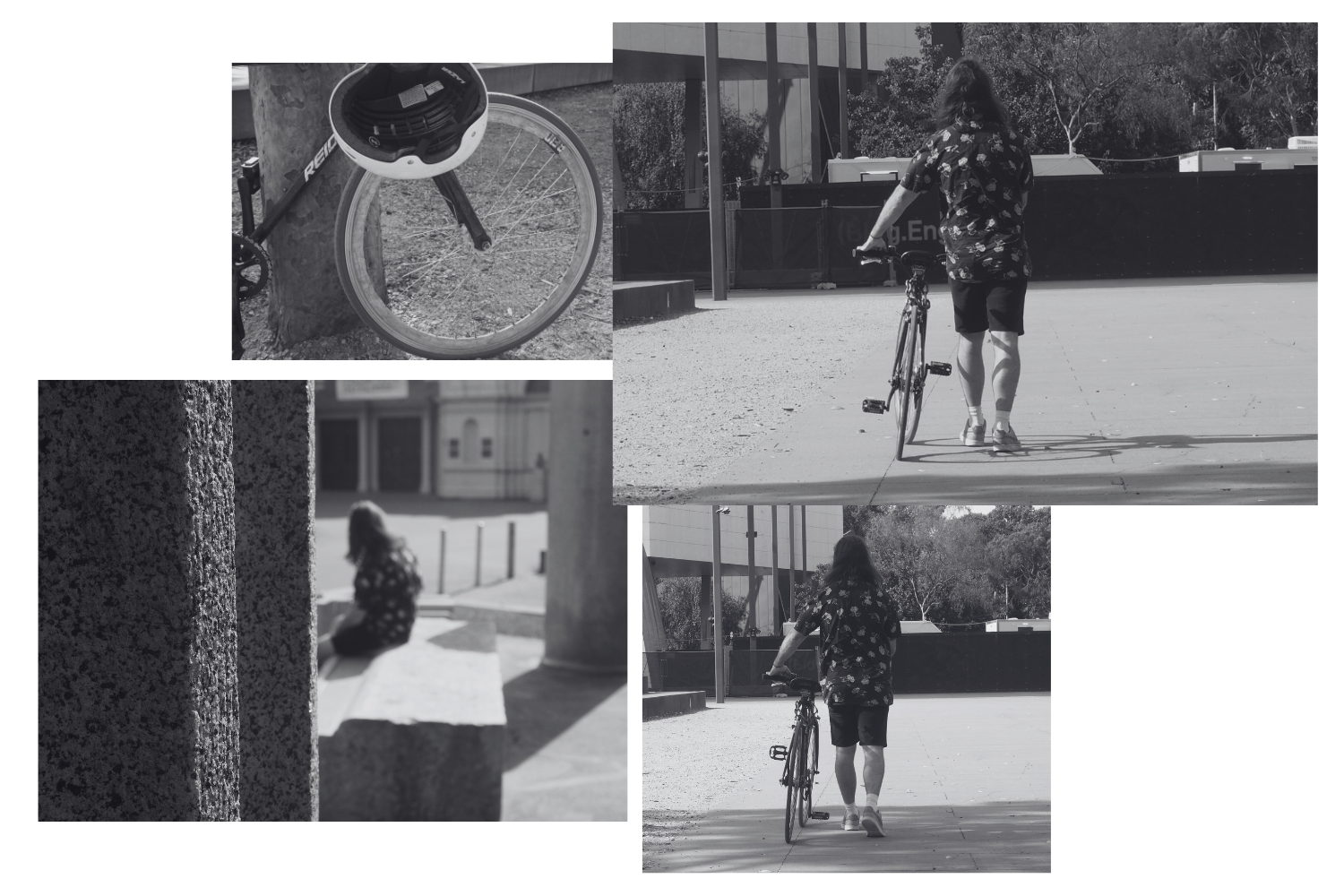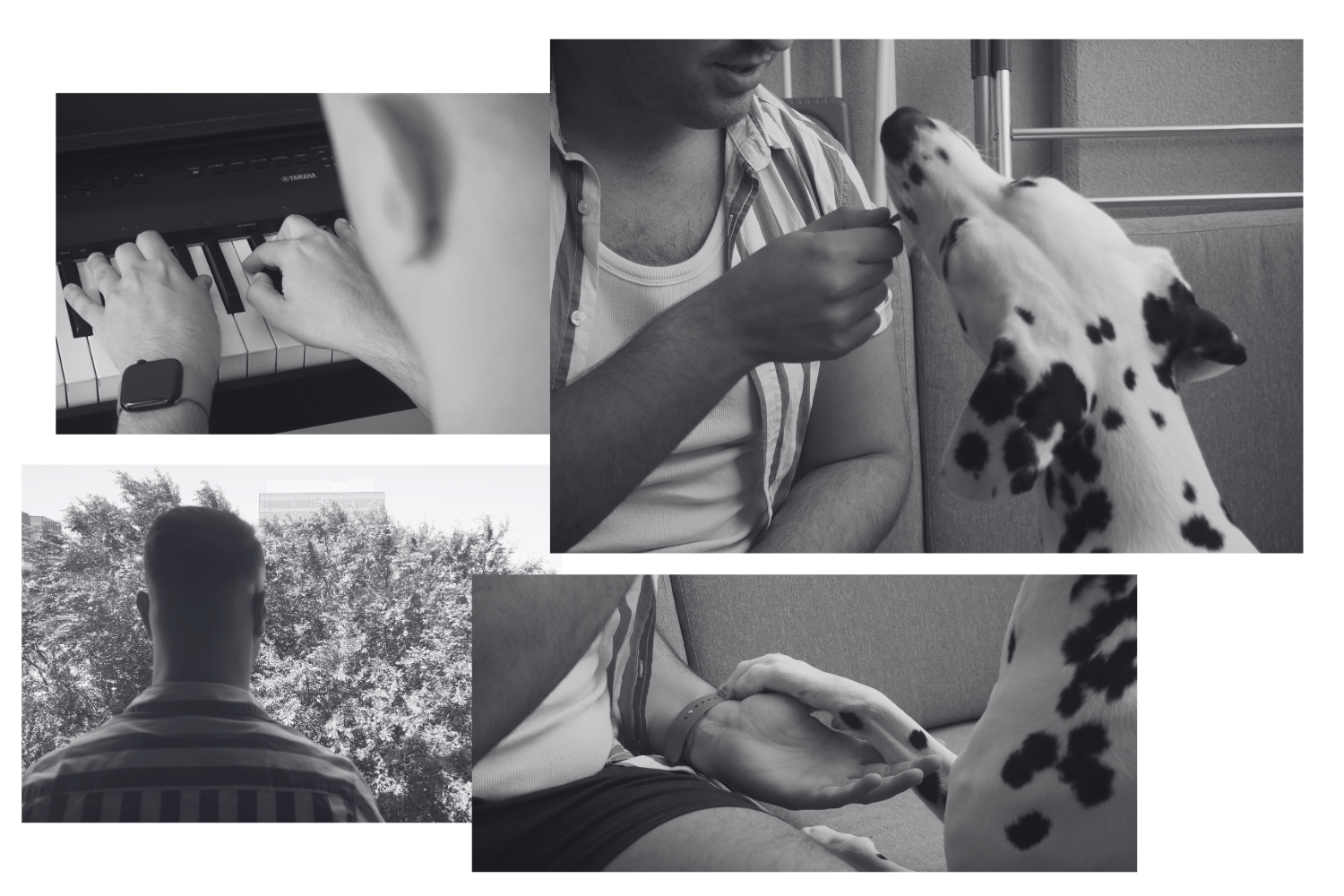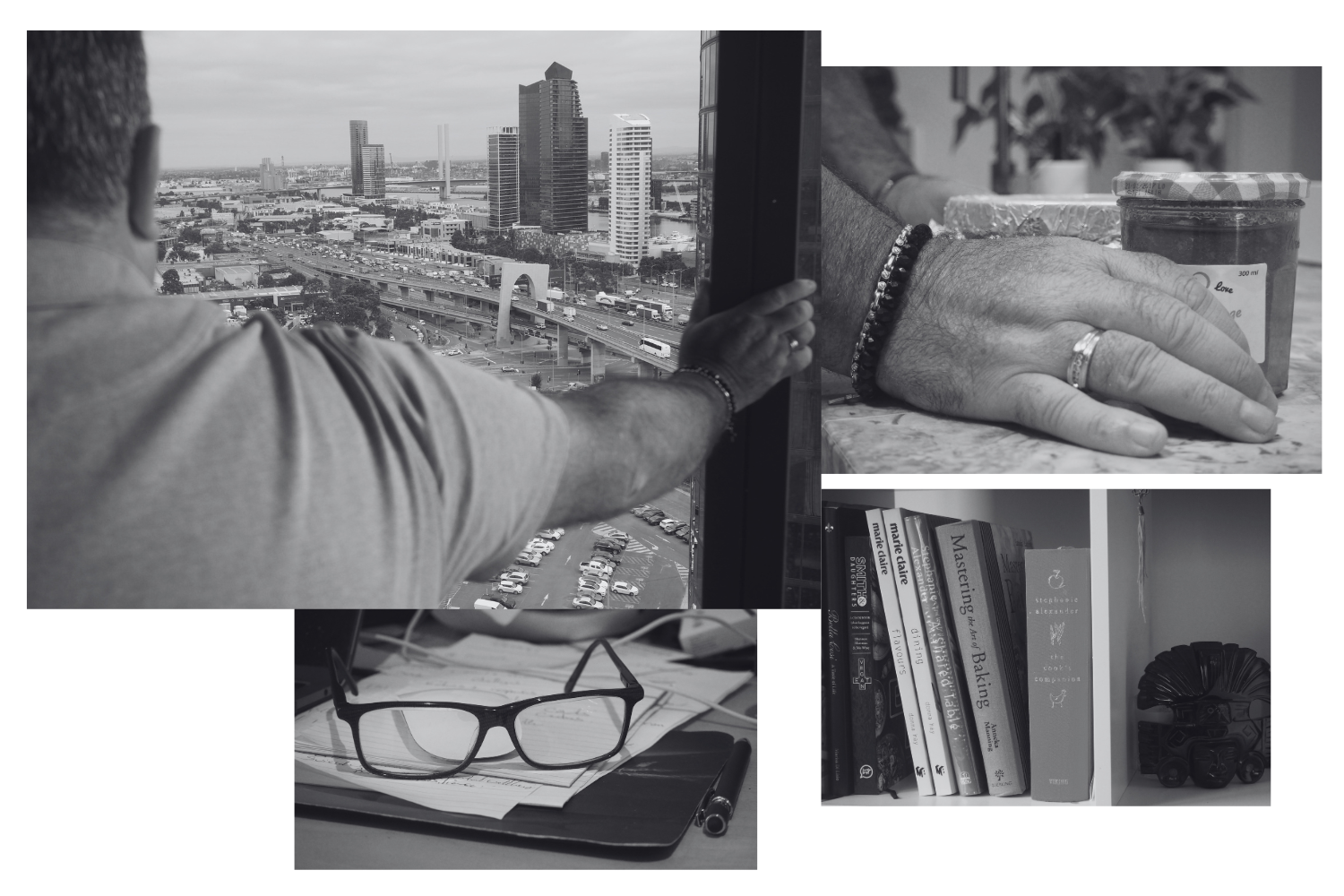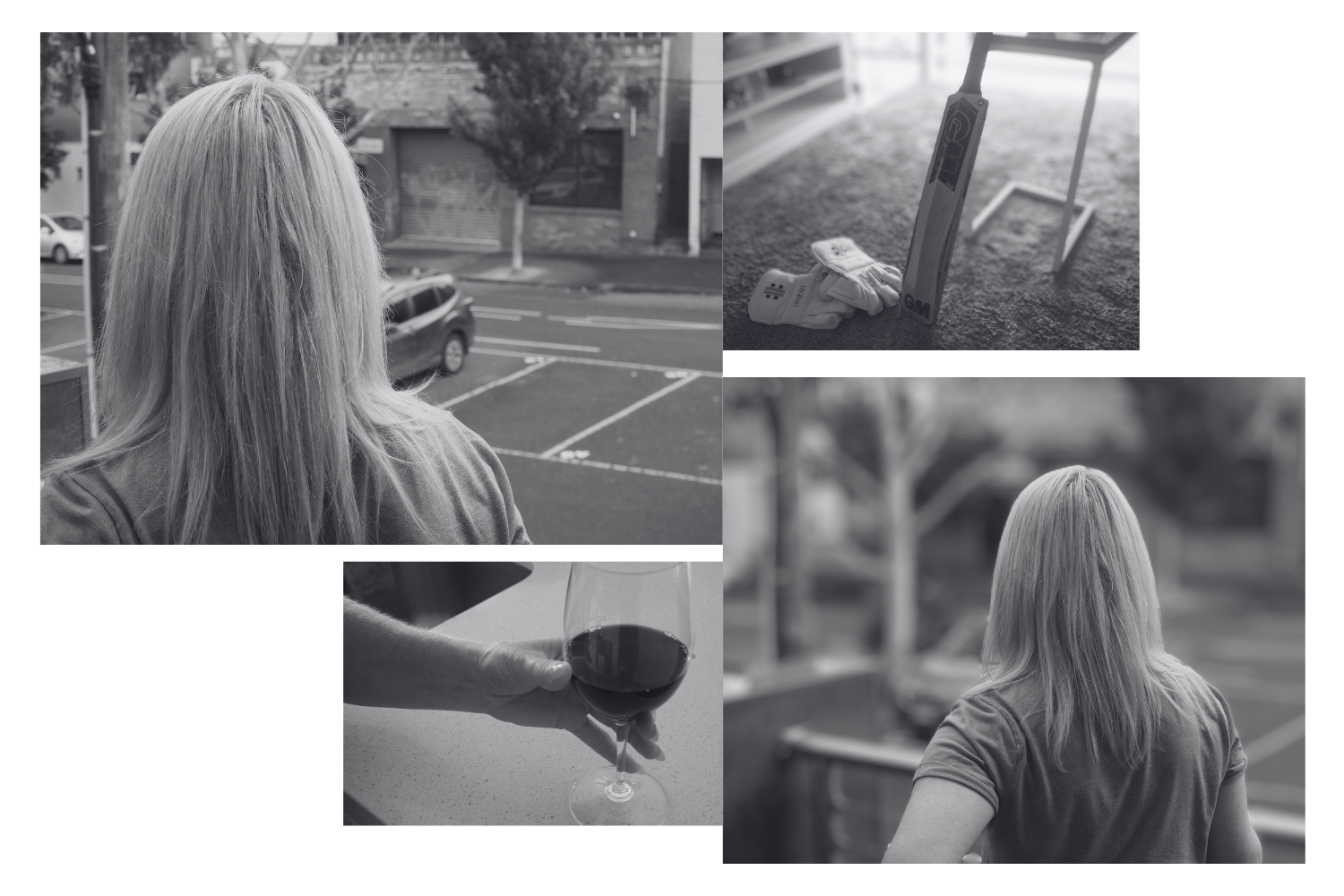.png)
Working together with researchers and clinicians at The Alfred, members of the community of people living with HIV in Victoria have been integral to progressing HIV cure research. What follows is an exploration of the stories of just some of these extraordinary people.
**
“I think this could definitely be something that collectively is part of the healing journey,” says Simon*, a young man living with HIV. “Even just knowing that people are not giving up on cure research is hopeful.”
We meet in a local public garden, speaking between the sounds of nearby skateboarders and the steady marching of pedestrians in each direction. As we sit, Simon remarks on the site as his ‘saving grace’ during Melbourne’s Covid lockdowns in 2020, a place outdoors where he found that he could go to be alone and to reflect.
Perhaps unknowingly, the scene also acts as an effective metaphor for Simon’s HIV experience, and that of many others.

Here, he is just a face like any other among the crowd.
The fact that he is HIV positive, Simon suggests, rarely plays into his mind, with the progress in antiretroviral treatments for those with HIV in the Western world effectively suppressing the virus and ensuring that the diagnosis is no longer the ‘death sentence’ it had once been.
Josie*, now almost a decade into her own HIV journey, agrees.
“I suppose I forget I'm even HIV positive from day-to-day, and they said that would happen,” says Josie. “You do forget until someone will say something like ‘oh my God, look at that guy it looks like he's got AIDS’ and it'll just be like a punch in the stomach.”
This ability for those with HIV to often forget their status is driven in no small part by the effectiveness of the antiretroviral treatments in eliminating the risks of transmission, symbolised in the modern HIV slogan of ‘U = U’, meaning undetectable equals untransmissible.
Still, while HIV might largely be controlled in Western countries such as Australia, the desire to discover a cure is as strong now as it had been years ago – with volunteer participants living with HIV leading the charge.
Turning attentions to his motivations for participating in recent HIV cure research trials, Simon is bashful, almost as if to suggest that his participation in such research is some kind of a foregone conclusion.
And he isn’t alone.
Like Simon, Zach offers little fanfare when discussing his own reasons for participating in the search for a cure.
“It's a long, long process the researchers are going to have to go through,” Zach explains. “It's probably going to be many years in the future that they'll finally find a cure, which maybe one day I might benefit in terms of a cure.”
“But it’s not about me, really.”
The remark is far from a throw-away, as it echoes the motivations shared by many of his peers also living with HIV and participating in these trials – and, in a way, much of the modern HIV experience itself.
“I guess through the years with my condition there's this whole generational guilt, like why am I so lucky to be born when I was born? Like I got to live, but a lot of people died at the start of the AIDS crisis in the 1980s and 1990s,” says Zach. “All those people unfortunately weren’t able to even have treatment, but I live in a day where I can have treatment and live my life as I want to.”
“So why should I not, in a way, give for the people who we've lost and try to help the people in the future?”
The influence of both the past and the future often looms large in conversation with people living with HIV, and perhaps nowhere more prominent than in the stigma that this community continues to face – even almost thirty years on from the peak of the AIDS epidemic.
“There's so much stigma around us, like as much as we've got a good treatment where people can live their lives,” Zach explains. “There is still stigma.”

So pervasive is this stigma that many of those diagnosed as HIV positive feel forced to shield their status from all but a select few, fearing discrimination or repercussions despite the effectiveness of modern HIV treatments.
“When I first found out about my diagnosis, it was completely unexpected because I had been pretty safe,” Simon recalls. “I just remember leaving after being diagnosed with HIV and not even knowing where to turn.”
“It was like nothing made sense anymore, everyone looked like an alien or I felt like an alien, and there was just such a disconnect from reality at that moment.”
Not aiding this disconnect is a broader lack of education around HIV, even among those from older generations who can more easily recall the darkest years of the AIDS epidemic in the late twentieth century. When Alastair* received his own diagnosis, he is quick to admit that his own lack of education about the virus played a key role in his initial shock.
“When I was diagnosed with HIV, it was a bolt out of the blue. I was not expecting it at all and it kind of knocked me off my feet, so I was very upset,” says Alastair. “Obviously I didn't know anything about the diagnosis and HIV.”
“I didn’t know what to expect, how long I was going to live, I had all of those questions that come up in your mind when you're given that diagnosis.”
“And I think it would be less traumatic if there wasn’t still stigma around this.”
Even for clinicians and researchers involved in HIV care, confronting this stigma is a necessary part of engaging with this community, as Alfred Infectious Diseases clinician Dr Jillian Lau suggests.
“It's a virus that historically has had so much stigma attached to it and that needs to be honoured and respected and remembered,” says Dr Lau. “But we are in a different world now with management of HIV and living with HIV.”
“The Alfred team and the doctor who I first saw were excellent at kind of just fobbing it off and saying ‘hey, it’s fine, there’s so many people dealing with this’ and that really calmed me down,” Alastair recalls. “But there’s still the stigma that you have in your head.”

Of course, much of the stigma still faced by those diagnosed with HIV owes to the lifestyle associations first attributed to AIDS at the height of the epidemic, that those who are diagnosed as HIV positive are ‘dirty’ or somehow responsible themselves for contracting the virus due to lifestyle choices.
“There’s this belief that most people who are HIV positive women, for example, would be sex workers or intravenous drug users, and so I felt like I was just this random outlier,” says Natasha*. “When in fact that's not the case at all, you know?”
“There are those people in the community and that’s fine, but it’s also much more varied than that, so I think getting that message across is important for tackling stigma and taking the lifestyle associations away from the diagnosis.”
Zach agrees.
“Even though it is not a death sentence anymore and you can live your life, there is just this horrible history behind it,” he says. “And it's going to take people a lot of years and a lot of strength to get over that.”
For at least some in the community of people living with HIV, joining the quest for cure has become a key part of the journey to overcome the virus’ legacy of stigma, particularly as treatments available in countries like Australia are not universal with health inequity persisting as a global problem.
This issue was particularly front of mind for Josie* when she began considering volunteering to participate in HIV cure trials.
“I'm personally in it for those that don't have access to what we have in terms of the medications or the free health appointments,” says Josie. “That's almost a death sentence.”
“So even if it doesn't work for me, and it works for someone else, it’s worth it.”
“There is so much inequity in healthcare around the world,” Simon offers. “So one person's managed virus is still one person's death sentence, because they can't get the medication or the access to treatment that they need.”
“I don’t know if I would have got past my diagnosis without the support of my clinicians, doctors and nurses,” Josie adds. “They were my saving grace.”
“I can't even imagine someone's life that doesn't have that.”

This sense of appreciation for the community of clinicians and researchers working with HIV is yet another driving factor that encourages those living with HIV to volunteer themselves for ongoing cure trials.
“I feel like I'm stepping into another world when I go to The Alfred,” says Natasha. “They’re always really warm and it does feel like you’re stepping into a little bubble, and there’s a real sense of community.”
While all areas of healthcare aspire to provide this kind of environment, there is nonetheless something inescapably unique about the community around HIV care.
“It is a family, it’s a great community,” says Associate Professor James McMahon, Head of Infectious Diseases Clinical Research at The Alfred, who also acts as President of the Australasian Society for HIV, Viral Hepatitis and Sexual Health Medicine (ASHM).
“We get a huge amount from our patients, where they're so thankful for the care that they receive and we're constantly getting positive feedback,” continues A/Prof McMahon. “And you are sort of looking out for each other, which is sort of family like, isn't it?”
Indeed, both A/Prof McMahon and Dr Lau have gone to particularly unique lengths themselves in support of this sense of community with the HIV community.
“A large part of why I do the trials is because the people in the research team are just so passionate,” says Alastair. “And what really impressed me is that Jill and James both had the biopsy themselves just to see what it was like.”
“They didn't need to do that, they were the researchers, but they went and had it so they can then advise the patient what the experience is going to be like. And that impressed me so much that I think I said to Jillian that I will be part of anything that you do.”
Dr Lau laughs when asked to recall volunteering herself for this biopsy process, which involves a fine needle being inserted into a lymph node in the groin in order to retrieve tissue samples.
“So we were, in inverted commas, healthy volunteers one and two, and that was mainly to test and validate the processes with the study protocol,” Dr Lau concedes. “And the extra advantage of doing that process myself as an investigator is that I know exactly what the people who I consent for this trial will go through.”
“And I know that because I've done that myself.”
Beyond just this process alone, Dr Lau suggests that HIV cure research more generally has enriched her relationships with this community even further.
“I think HIV cure research has brought me closer to the HIV positive community and people not just living with HIV, but also those affected by HIV. So their families, those on PrEP, those who are still facing stigma and discrimination,” Dr Lau explains. “And I think just working in research in this area, particularly with cure, has brought me closer to the community.”
“And it has really emphasized to me as a researcher the importance of taking them on this journey, you know, and being on that journey with them.”
Ultimately, it becomes clear that the quest for an HIV cure remains one defined by hope, relying upon the courage and compassion of a unique community, who are themselves inspired both by the lessons of the past and a vision for the future ahead.
“I hope people know that it’s been a long journey,” says Simon. “But we’re definitely kicking its ass, for sure.”
**
*At request, pseudonyms have been used for some participants to respect anonymity
James Cutler – Media and Communications Advisor
j.cutler@alfred.org.au 0482 717 054